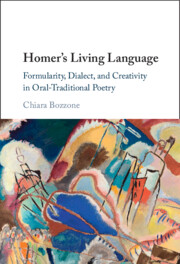Book contents
- Homer’s Living Language
- Homer’s Living Language
- Copyright page
- Dedication
- Contents
- Figures
- Tables
- Acknowledgments
- Note on the Transliteration
- Abbreviations
- Introduction The Paradox of Homeric Creativity
- Chapter 1 Formularity
- Chapter 2 Meter
- Chapter 3 Dialect
- Chapter 4 Creativity
- Conclusion Creativity, Memory, and the Muses
- Glossary of Linguistic Terms
- References
- Index Locorum
- General Index
- Index of Homeric forms
- Index of PIE forms
- Index of Homeric phraseology
Chapter 4 - Creativity
Published online by Cambridge University Press: 11 April 2024
- Homer’s Living Language
- Homer’s Living Language
- Copyright page
- Dedication
- Contents
- Figures
- Tables
- Acknowledgments
- Note on the Transliteration
- Abbreviations
- Introduction The Paradox of Homeric Creativity
- Chapter 1 Formularity
- Chapter 2 Meter
- Chapter 3 Dialect
- Chapter 4 Creativity
- Conclusion Creativity, Memory, and the Muses
- Glossary of Linguistic Terms
- References
- Index Locorum
- General Index
- Index of Homeric forms
- Index of PIE forms
- Index of Homeric phraseology
Summary
This chapter develops a theory of Homeric creativity that is informed by both contemporary cognitive studies and by ancient ideas about poetic craft and divine inspiration, as seen through the lenses of archaic poetry and Plato’s Ion. Sections 1-2 survey the conceptions of the poet as a craftsman vs. divinely inspired in Homer, Hesiod, Archilochus, Pindar, Democritus, and Plato. Section 3 introduces the modern study of creativity in the field of cognitive psychology, the study of jazz improvisation, and the concept of flow. Section 4 introduces the neuroscience of improvisation, including recent fMRI studies on jazz and lyric improvisation. The results of these studies (pointing to a state of hypofrontality when carrying out complex improvisational tasks) are compatible with some ancient ideas on creativity and inspiration (such as the idea that an external source - like the Muses- might be involved in these creative acts).
Keywords
- Type
- Chapter
- Information
- Homer's Living LanguageFormularity, Dialect, and Creativity in Oral-Traditional Poetry, pp. 194 - 222Publisher: Cambridge University PressPrint publication year: 2024



